Delivering for Ordinary People (with Marina Hyde)
Comedy writer Armando Iannucci decodes the utterly baffling world of political language.
This week, Helen Lewis is still away, so Journalist Marina Hyde steps in to join Armando. They discuss what an ordinary person might be, and examine if politicians use them as cover? Why is it always that things 'ordinary people' are saying 'on the doorstep' just so happen to be the exact things they wanted to do anyway?
We also look at delivery in politics. Do we believe politicians when they say they'll deliver? And do we reward them fairly when they do?
Listen to Strong Message Here every Thursday at 9.45am on Radio 4 and then head straight to BBC Sounds for an extended episode.
Have you stumbled upon any perplexing political phrases you need Helen and Armando to decode? Email them to us at strongmessagehere@bbc.co.uk
Sound Editing by Chris Maclean
Production Coordinator - Sarah Nicholls
Executive Producer - Pete Strauss
Produced by Gwyn Rhys Davies. A BBC Studios Audio production for Radio 4.
An EcoAudio Certified Production.
Press play and read along
Transcript
Transcript is processing—check back soon.

